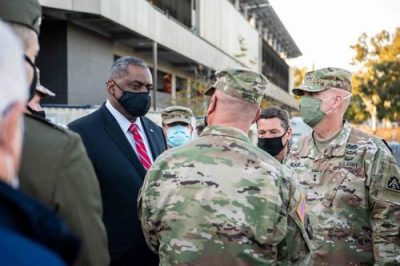US Will Not Undertake Hasty Withdrawal from Afghanistan: US Secretary of Defense Lloyd Austin
Austin made clear that he is committed to consulting with Allies and partners throughout this process.

All Global Research articles can be read in 51 languages by activating the “Translate Website” drop down menu on the top banner of our home page (Desktop version).
Visit and follow us on Instagram at @crg_globalresearch.
***
Of relevance to unfolding events, this article was originally published on February 19, 2021.
US Secretary of Defense Lloyd J. Austin on Thursday said the United States would not undertake a hasty or disorderly withdrawal from Afghanistan.
Addressing the second and final day of the NATO Defense Ministerial, Austin thanked Allies for their continued commitment to the Resolute Support Mission and reiterated that the US remains committed to a diplomatic effort to end the war.
He told the Allies that the US is conducting a thorough review of the conditions of the US-Taliban Agreement to determine whether all parties have adhered to those conditions.
Austin made clear that he is committed to consulting with Allies and partners throughout this process.
He reassured Allies that the US would not undertake a hasty or disorderly withdrawal from Afghanistan.
On Iraq, the Secretary reaffirmed the US commitment to the enduring defeat of ISIS, respecting Iraq’s sovereignty, and ensuring long-term regional stability. He noted that the recent rocket attack in Erbil underscores the importance of our continued work in the region.
Addressing the same event, British Defense Secretary Ben Wallace reaffirmed his country’s commitment to the Afghan peace process and said the UK Government remains resolute in its support to the government of Afghanistan in the face of unacceptable Taliban violence.
“We are determined to ensure that conditions are met for achieving a lasting political settlement, which is the only means of ensuring security from terrorism for the people of Afghanistan, the United Kingdom and its Allies,” he said.
He affirmed to allies that the UK remains committed to the operation and supporting the Afghan peace process.
No Decision on Future Posture
NATO Secretary-General Jens Stoltenberg said Thursday at end of the two NATO Defense Ministers meetings in Brussels that the military alliance will only leave Afghanistan when security conditions on the ground allow it.
Stoltenberg said that at this stage, the alliance has not made a final decision about a troop presence in Afghanistan.
“At this stage, we have made no final decision on the future of our presence, but, as the May 1 deadline is approaching, NATO Allies will continue to closely consult and coordinate in the coming weeks,” said Stoltenberg at a press conference in Brussels.
“We remain committed to our Resolute Support mission, with training and funding for the brave Afghan security forces,” he said.
“Defense Ministers had a thorough discussion on the situation in Afghanistan. We are faced with many dilemmas and there are no easy options,” he said.
On the importance of peace in Afghanistan, he said:
“NATO strongly supports the peace process, and as part of it, we have significantly reduced the number of our troops. The peace process is the best chance to end years of suffering and violence. And bring lasting peace. It is important for the Afghan people, for the security of the region and for our own security.”
He said the talks are fragile, and progress is slow.
“The Taliban must negotiate in good faith, reduce the high level of violence and live up to their commitment to stop cooperating with international terrorist groups,” he said.
The NATO chief said that the presence of alliance troops in Afghanistan was conditions-based, stating that the Taliban needs to abide by their commitments within the framework of the Doha agreement from last February.
Stoltenberg said that US Defense Secretary Lloyd Austin assured allies that the US will work together with NATO on Afghanistan.
The US-Taliban Peace Agreement
On February 29 last year, former US President Donald Trump struck a peace agreement with the Taliban under which Washington agreed foreign troops would leave Afghanistan by May 2021 in return for conditions including cutting ties with Al-Qaeda and opening peace talks with Afghan sides.
But President Joe Biden’s administration has said it would review the deal, with the Pentagon accusing the Taliban of not meeting their commitment to reducing violence as agreed in the Doha deal.
The Taliban in turn has accused the US of breaching the agreement and insisted it will continue its “fight” if foreign troops do not leave Afghanistan by May.
Earlier this month, a bipartisan study group assigned by US Congress called on President Joe Biden’s administration to slow the withdrawal of American troops from Afghanistan, remove the May 1 exit deadline and instead reduce the number of forces only as security conditions improve in the country.
The Taliban has said that such a move would have severe consequences and that Washington will be responsible for a future escalation.
The talks between the delegation representing the Islamic Republic of Afghanistan and the Taliban launched on September 12 of 2020, but progress has been slow and overshadowed by the high-level violence.
*
Note to readers: Please click the share buttons above or below. Follow us on Instagram, @crg_globalresearch. Forward this article to your email lists. Crosspost on your blog site, internet forums. etc.
Featured image is from DoD/Air Force

